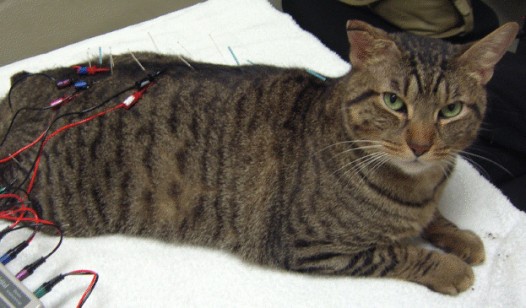
Sharon Litwin (photo by Jason Kruppa)
Editor’s Note: In honor and memory of Sharon Litwin, The Queen here at NolaVie, we will be publishing a piece from her every day for the next month. Sharon was an advocate and spokeswoman for arts, culture, people, and policies here in New Orleans. Her voice and sharp wit will be greatly missed.
To listen to Sharon Litwin’s interview with Dr. Cynthia Benbow on WWNO-FM, click here.
It was Dr. Cynthia Benbow’s father who finally put it all into perspective. You can’t talk a dog into feeling better, he said to her. There’s no placebo effect with an animal. So if you stick in a needle and it makes the dog feel better, then there must be something to it, he reasoned.
The “it”, of course, is acupuncture — until fairly recently, not something embraced by large numbers of the professional veterinary community. Even Dr. Benbow, now an advocate, admits to being a skeptic.
“I thought it was a bunch of voodoo,” she says. But that was before she investigated animal acupuncture at the University Of Colorado Veterinary School.
Now a certified animal acupuncturist, she has learned how this ancient Chinese method of inserting tiny thin needles into a precise location helps to ease pain.
“Animals today are living much longer,” she says. “Many are on pain medications or supplements because they have arthritis and there’s nothing more that can be done for them. So we will use acupuncture and it really helps. The Chinese actually use acupuncture as a preventive and, while I do see a couple of puppies whose owners are doing that, there aren’t many others.”
She doesn’t just treat cats and dogs, though. There are all kinds of exotic pets that need a little help, froms tiny creatures like birds to huge ones like horses.
“Interestingly, the wilder the animal, the better they do,” Benbow says. “Birds and horses respond really well; they’ll fall asleep right away. I’ve treated horses that have come in lame and been able to walk out afterward. Dogs, while better responders than humans, don’t respond as well as cats.”

Snoopy the cat gets and acupuncture session.
Dr. Benbow thinks that’s because dogs are more domesticated. But, she says, they will respond to acupuncture, although it might take two or three sessions before they do so fully.
“I remember I had this one police dog that was pretty aggressive and I could only place about three needles in on the first visit,” Benbow recalls. “The second visit, I snuck in about five or six. On the third visit, that dog came up to me and sat down as if to say, put those needles in. That dog knew he was going to feel better. It’s like my father said: There’s no placebo effect in an animal.”
For more information about animal acupuncture, visit the International Veterinary Acupuncture Society at www.ivas.org or the Chi Institute of Chinese Medicine at www.tcvm.org. Dr. Benbow can be reached at benbowvetservice@gmail.com or 504-281-4288.
In the video below, Lacey, a 6-year-old miniature schnauzer who does competitive agility competitions, gets an acupuncture session from Dr. Benbow. It shows how relaxing acupuncture can be: She yawns a lot during her sessions.
“This yawn tells me she is getting her endorphin release and she is responding to acupuncture,” Benbow notes. “This particular patient, before putting needles in her, was hiding under a chair, trembling, anxious and not wanting to come by us. As you can see she is now relaxed, not being restrained, and enjoying us.”
Sharon Litwin is editor of NolaVie.
 NOLAbeings Multimedia artist Claire Bangser created NOLAbeings as a portrait-based story project that marries...
NOLAbeings Multimedia artist Claire Bangser created NOLAbeings as a portrait-based story project that marries...  Voodoo in New Orleans: Reviving history: New Orleans fortune telling This article takes a deep dive into the history of Voodoo in New Orleans, its hybridization with Catholicism, and its present-day place in the city's culture. The author visits fortune-tellers in the French Quarter, using their guidance as a tool for introspection rather than a deterministic predictor of the future. Through her experiences in New Orleans, the author feels a mystical connection to both the past and the future.
Voodoo in New Orleans: Reviving history: New Orleans fortune telling This article takes a deep dive into the history of Voodoo in New Orleans, its hybridization with Catholicism, and its present-day place in the city's culture. The author visits fortune-tellers in the French Quarter, using their guidance as a tool for introspection rather than a deterministic predictor of the future. Through her experiences in New Orleans, the author feels a mystical connection to both the past and the future. 